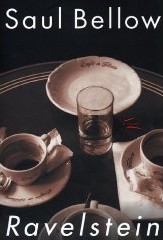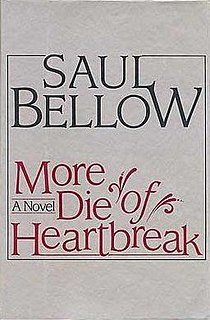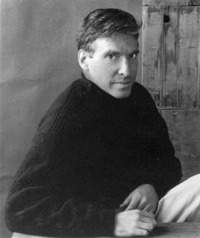 First edition cover | |
| Author | Saul Bellow |
|---|---|
| Country | United States |
| Language | English |
| Publisher | Vanguard Press |
Publication date | 1944 |
| Media type | Print (Hardback & Paperback) |
Dangling Man is a 1944 novel by Saul Bellow. It is his first published work.
 First edition cover | |
| Author | Saul Bellow |
|---|---|
| Country | United States |
| Language | English |
| Publisher | Vanguard Press |
Publication date | 1944 |
| Media type | Print (Hardback & Paperback) |
Dangling Man is a 1944 novel by Saul Bellow. It is his first published work.
Written in diary format, the story centers on the life of an unemployed young man named Joseph, his relationships with his wife and friends, and his frustrations with living in Chicago and waiting to be drafted. His diary serves as a philosophical confessional for his musings. It ends with his entrance into the army during World War II, and a hope that the regimentation of army life will relieve his suffering. Along with Bellow's second novel The Victim , it is considered his "apprentice" work.
Some critics, including Edmund Wilson and Kenneth Fearing, [1] criticized the novel's lack of a definite plot, but praised Bellow's depiction of what they saw as the characteristic features of the generation of American intellectuals raised during the Great Depression. Dangling Man can be seen as a superfluous man narrative, raising interesting parallels with Turgenev's The Diary of a Superfluous Man and exploring the 19th-century Russian literary concept through a contemporary American experience.
Irving S. Saposnik, in The Centennial Review, wrote that "None of Saul Bellow's other novel's (sic) has perplexed his critics more than his first novel, Dangling Man. [2]
The title Dangling Man, an episode of the television show The Crown , references the work. Prince Charles, as portrayed by Josh O'Connor, compares himself to Joseph during the episode. [3]

Saul Bellow was a Canadian-American writer. For his literary work, Bellow was awarded the Pulitzer Prize, the Nobel Prize for Literature, and the National Medal of Arts. He is the only writer to win the National Book Award for Fiction three times and he received the National Book Foundation's lifetime Medal for Distinguished Contribution to American Letters in 1990.

Bernard Malamud was an American novelist and short story writer. Along with Saul Bellow, Joseph Heller, and Philip Roth, he was one of the best known American Jewish authors of the 20th century. His baseball novel, The Natural, was adapted into a 1984 film starring Robert Redford. His 1966 novel The Fixer, about antisemitism in the Russian Empire, won both the National Book Award and the Pulitzer Prize.

Yaddo is an artists' community located on a 400-acre (160 ha) estate in Saratoga Springs, New York. Its mission is "to nurture the creative process by providing an opportunity for artists to work without interruption in a supportive environment." On March 11, 2013 it was designated a National Historic Landmark.

Irving Howe was an American literary and social critic and a prominent figure of the Democratic Socialists of America.

Invisible Man is a novel by Ralph Ellison, published by Random House in 1952. It addresses many of the social and intellectual issues faced by the African Americans in the early twentieth century, including black nationalism, the relationship between black identity and Marxism, and the reformist racial policies of Booker T. Washington, as well as issues of individuality and personal identity.
Mark Harris was an American novelist, literary biographer, and educator.
James Gould Cozzens was a Pulitzer prize-winning American author whose work enjoyed an unusual degree of popular success and critical acclaim for more than three decades. His 1949 Pulitzer win was for the WWII race novel Guard of Honor, which more than one critic considered one of the most important accounts of the war. His 1957 Pulitzer nomination was for the best-selling novel By Love Possessed, which was later made into a popular 1961 film.

Henderson the Rain King is a 1959 novel by Saul Bellow. The book's blend of philosophical discourse and comic adventure has helped make it one of his more popular works.

Herzog is a 1964 novel by Saul Bellow, composed in part of letters from the protagonist Moses E. Herzog. It won the U.S. National Book Award for Fiction and the Prix International. In 2005, Time magazine named it one of the 100 best novels in the English language since Time's founding in 1923.

Ravelstein is Saul Bellow's final novel. Published in 2000, when Bellow was eighty-five years old, it received widespread critical acclaim. It tells the tale of a friendship between a university professor and a writer, and the complications that animate their erotic and intellectual attachments in the face of impending death. The novel is a roman à clef written in the form of a memoir. The narrator is in Paris with Abe Ravelstein, a renowned professor, and Nikki, his lover. Ravelstein, who is dying, asks the narrator to write a memoir about him after he dies. After his death, the narrator and his wife go on holiday to the Caribbean. The narrator catches a tropical disease and flies back to the United States to convalesce. Eventually, on recuperation, he decides to write the memoir.
This is a list of bestselling novels in the United States in the 1970s, as determined by Publishers Weekly. The list features the most popular novels of each year from 1970 through 1979.

More Die of Heartbreak is a 1987 novel by the American author Saul Bellow, and was his tenth novel. Like most of Bellow's other works, More Die of Heartbreak is grounded more in the development of character than in the growth of action. Among its themes are the difficulties of reconciling one's ideals with "the actual" and the difficulties of relating to parents and to mortality. The protagonist of the novel, Kenneth Trachtenberg, is an intellectually gifted and philosophically tortured man attempting to work out his fate and worldview.

Bye Bye Braverman is a 1968 American comedy film directed by Sidney Lumet. The screenplay by Herbert Sargent was adapted from the 1964 novel To an Early Grave by Wallace Markfield.
Irving Malin was an American literary critic. Malin attended Thomas Jefferson High School and Jamaica High School and graduated magna cum laude from Queens College in 1955 and received his PhD from Stanford University in 1958. He married Ruth Lief in 1955 and they remained married until his death. He taught at the City College of New York from 1960 until his retirement in 1996. Malin did his dissertation on the fiction of William Faulkner and made his initial academic mark as a critic of American Jewish Literature, editing an early collection on the fiction of Saul Bellow as well as a critical book and a general anthology on Jewish literature in the US. He subsequently became interested in writers who practiced innovative techniques such as James Purdy and John Hawkes as well as writers who broke down the boundaries between fiction and nonfiction such as William Styron and Truman Capote. One of the pioneering academics to take an interest in metafiction and experimental writing, Malin was an early contributor to the Review of Contemporary Fiction, writing over five hundred book reviews for this and other publications. In the latter portion of his career, Malin edited several anthologies of essays on Henry James, Thomas Pynchon, William Goyen, George Garrett, Don DeLillo, Vladimir Nabokov, Leslie Fiedler, and William Gass. He was a fellow at Yaddo and the Huntington Library and served on many boards and award panels. Malin died December 3, 2014.
Isaac Rosenfeld was a Jewish-American writer who became a prominent member of New York intellectual circles. Rosenfeld wrote one novel, which, according to literary critic Marck Shechner, "helped fashion a uniquely American voice by marrying the incisiveness of Mark Twain to the Russian melancholy of Dostoevsky," and many articles for The Nation, Partisan Review, and The New Republic. Some of those articles were posthumously published in a volume titled An Age of Enormity, and his short stories were later published as Alpha and Omega.

Benjamin Taylor is an American writer whose work has appeared in a number of publications including The Atlantic, Harper's, Esquire, Bookforum, BOMB, the Los Angeles Times, Le Monde, The Georgia Review, Raritan Quarterly Review, Threepenny Review, Salmagundi, Provincetown Arts and The Reading Room. He is a founding member of the Graduate Writing Program faculty of The New School in New York City, and has also taught at Washington University in St. Louis, the Poetry Center of the 92nd Street Y, Bennington College and Columbia University. He has served as Secretary of the Board of Trustees of PEN American Center, has been a fellow of the MacDowell Colony and was awarded the Iphigene Ochs Sulzberger Residency at Yaddo. A Trustee of the Edward F. Albee Foundation, Inc., he is also a Fellow of the New York Institute for the Humanities at New York University and a Guggenheim Fellow for 2012 - 2013. Taylor's biography of Marcel Proust, Proust: The Search, was published in October 2015 by Yale University Press as part of its newly launched Yale Jewish Lives series.

Arguably: Essays is a 2011 book by Christopher Hitchens, comprising 107 essays on a variety of political and cultural topics. These essays were previously published in The Atlantic, City Journal, Foreign Affairs, The Guardian, Newsweek, New Statesman, The New York Times Book Review, Slate, Times Literary Supplement, The Wall Street Journal, The Weekly Standard, The Wilson Quarterly, and Vanity Fair. Arguably also includes introductions that Hitchens wrote for new editions of several classic texts, such as Animal Farm and Our Man in Havana. Critics' reviews of the collection were largely positive.
Melvin Marvin Tumin was an American sociologist who specialized in race relations. He taught at Princeton University for much of his career.
Jack Barry Ludwig was a Canadian-born American-resident novelist, short story writer, and sportswriter.
Works by or about James Wood, English critic and writer.